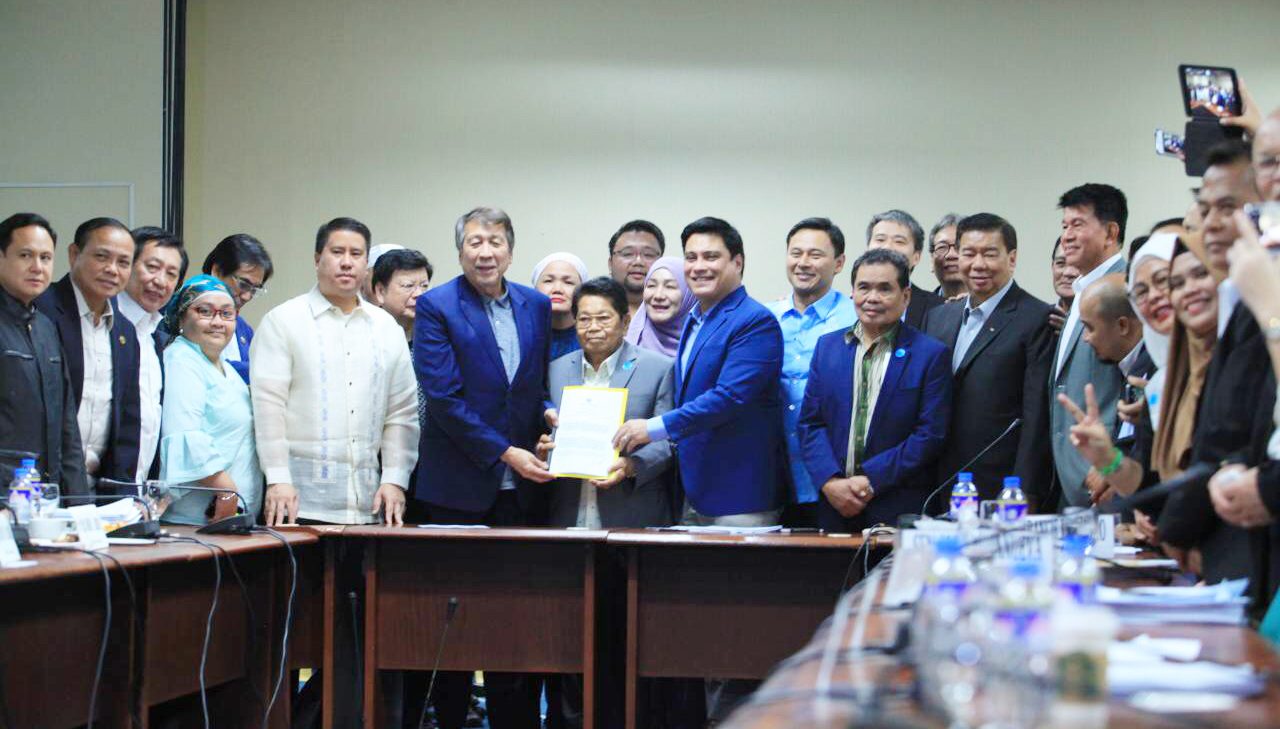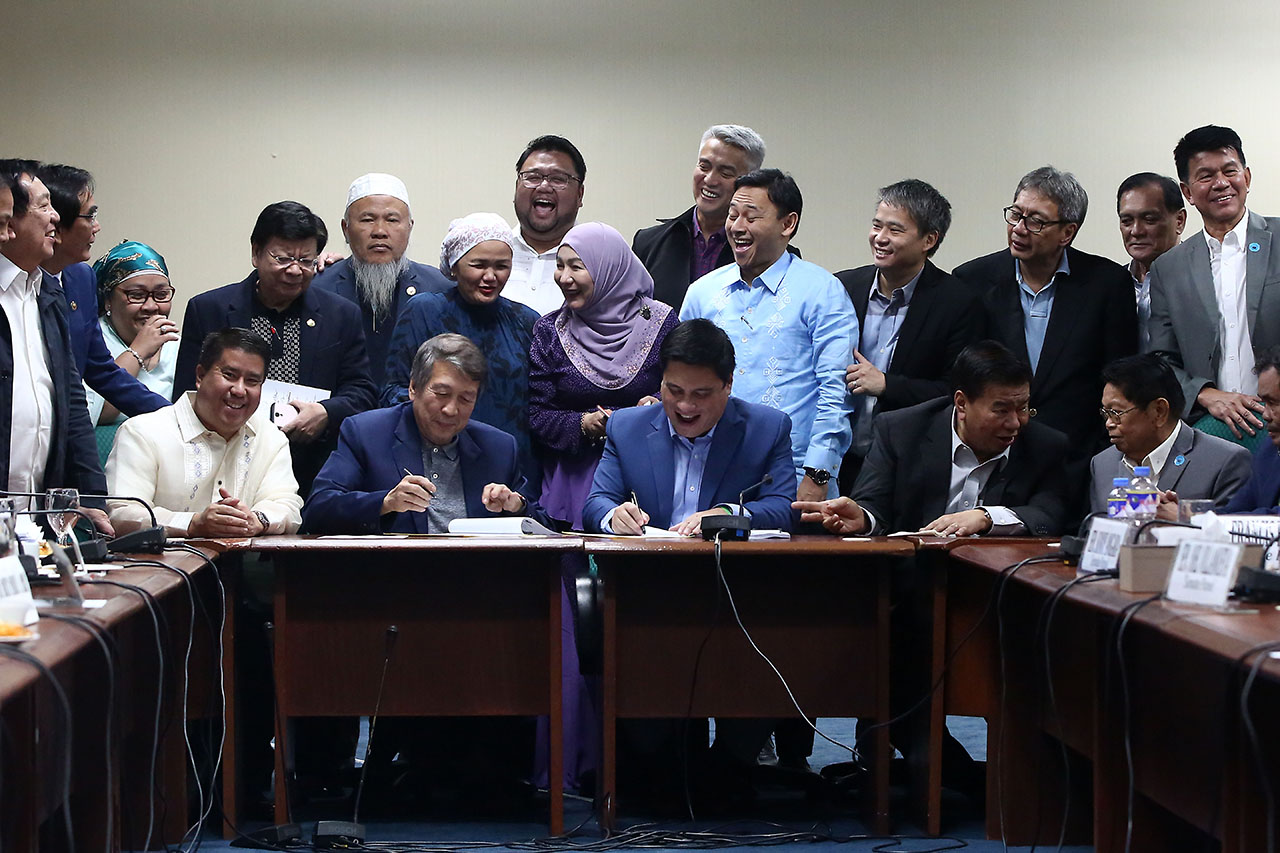SUMMARY
This is AI generated summarization, which may have errors. For context, always refer to the full article.


MANILA, Philippines (3rd UPDATE) – The bicameral conference committee finalized on Wednesday, July 18, the bill that would establish and grant greater autonomy to a new Bangsamoro region.
It took the bicam more than a week to reconcile the differing provisions of the House and Senate versions of the measure, with heated exchanges between members.
The House and the Senate would now have to ratify the bicameral conference committee report. They are set to do it on Monday, July 23, during the opening of the 3rd session of the 17th Congress and ahead of President Rodrigo Duterte’s 3rd State of the Nation Address (SONA).
Duterte is expected to sign the proposed Bangsamoro measure into law just hours before his SONA.
The final version, officially named the Bangsamoro Organic Law, seeks to abolish the Autonomous Region in Muslim Mindanao (ARMM) and replace it with the Bangsamoro Autonomous Region in Muslim Mindanao, which would have greater fiscal autonomy, a regional government, parliament, and justice system.
The proposed region would be composed of the current ARMM – Tawi-Tawi, Sulu, Basilan, Maguindanao, and Lanao del Sur – pending a regional plebiscite.
The bill also seeks to include 6 municipalities of Lanao del Norte and 39 barangays of North Cotabato in the Bangsamoro, provided that the province and their municipalities, respectively, vote for it. These areas previously voted to be included in the ARMM but failed when their mother units voted otherwise.
This was the most contentious provision in the bill, leading to an initial deadlock. The panel eventually sought the advice of the President, who in the end sided with the House on the issue and not with the Bangsamoro Transition Commission (BTC).
The chartered cities of Cotabato and Isabela would also be included in the proposed region, subject to the approval of their respective registered voters in the plebiscite.
The bill also has an opt-in provision, allowing adjacent areas to join the Bangsamoro, with a petition of at least 10% of their voters.
‘Not perfect, but good start’
Senate Majority Leader Juan Miguel Zubiri first moved to accept the Bangsamoro bill on the part of the senators. House Majority Leader Rodolfo Fariñas followed soon after for the lower chamber. At 8:52 pm, both legislators hit their gavels, signaling the bicam’s acceptance of the measure.
Cheers and applause erupted in the room.
Bangsamoro Transition Commission (BTC) chairperson and Moro Islamic Liberation Front vice chairperson Ghazali Jaafar as well as MILF chief negotiator Mohagher Iqbal were later called in front to join the ceremonial signing of the bill.
“We are satisfied. It is not a perfect law, but it is good to start with. It is very important to us,” said Jaafar before the bicam members.
Some lawmakers hugged and patted each other’s backs, having spent 6 grueling days reconciling the bill’s contentious provisions.

Just before the approval, House Deputy Speaker Bai Sandra Sema flashed a piece of paper bearing the words “Thank you” to Zamboanga City 1st District Representative Celso Lobregat, with whom she had several heated debates concerning the jurisdiction over the resource-rich Sulu Sea and the Moro Gulf.
Sema then approached Lobregat as he wrote the words “You’re welcome” on another piece of paper. The two lawmakers then posed for a photo.
Among the last issues the bicam settled were provisions over the preamble and the date of the plebiscite.
Fariñas said they finally settled on the phrase, “We, the Filipino people, cognizant of the aspirations of the Bangsamoro people.”
The bicam also agreed the plebiscite would be held not earlier than 90 days and not later than 150 days from Duterte’s approval of the law.
Zubiri added that the first regular elections in the new region would coincide with the national elections in May 2022.
Parliament, justice, wealth
Once the bill is signed into law, a Bangsamoro government would be established, headed by a chief minister and a ceremonial leader called a Wali.
There would also be a parliament composed of 80 members – 50% party representatives, 40% district representatives, and 10% sectoral representatives, including two reserved seats for “non-Moro indigenous peoples and settler communities.”
Despite having its own government, the Bangsamoro would not have its own military and police force, as these would still be under the national government. (READ: Bicam adopts Senate provision vs Bangsamoro firearms purchase)
As for justice, the region will have its own system based on the unique cultural and historical heritage of the Bangsamoro. (READ: Bicam approves creation of Shari’ah High Court in Bangsamoro)
The justice system of the region would be aligned with the 1987 Constitution, Shari’ah or Islamic law, traditional or tribal laws, and other relevant laws.
Shari’ah law would apply exclusively to cases involving Muslims. If a case involves a non-Muslim, Shari’ah law may apply only if the non-Muslim voluntarily submits to the jurisdiction of the Shari’ah court.
The traditional or tribal laws, meanwhile, would be applicable to disputes of indigenous peoples within the Bangsamoro.
The bill also seeks 75-25 wealth sharing between the national and Bangsamoro government. This means 75% of the national internal revenue collection would go to the Bangsamoro, and 25% to the central government.
An annual block grant, pegged at a 5% share of the national internal revenue or some P59 billion, would also be automatically appropriated to the region without any conditions.
The Bangsamoro region would also primarily oversee all inland bodies of water, except for those that produce energy for other areas outside its jurisdiction. Energy-producing bodies of water, like Lake Lanao, would instead be co-managed by the region together with the Department of Energy. – Rappler.com
Add a comment
How does this make you feel?
There are no comments yet. Add your comment to start the conversation.